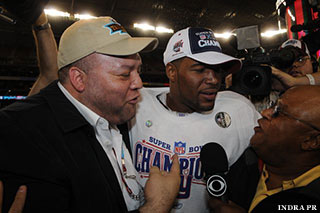
He's impossible to miss. Turn on the Super Bowl, he's there. Turn on the news, he's there. Go to the groundbreaking of an ice-rink facility, he's there.
Rich "Big Daddy" Salgado, 47, is one of the sports world's most present figures. At 6-5, the former Maryland Terrapins offensive lineman is also physically hard to ignore.
So who is this man who celebrates sacks on the sideline with Justin Tuck, eats dinner with Michael Strahan and chats with ESPN's Adam Schefter, all in a day's work?
Salgado is an insurance advisor, which might not sound all that sexy, but he's one of the most trusted men among professional athletes and sports media.
Injuries are the Kryptonite of professional athletes. Riches can evaporate in a split second with a torn ACL, a ringing concussion or an irregular heartbeat. Contracts can only protect so much (or so little).
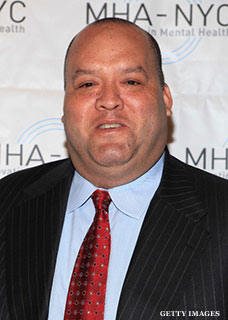
This is where Salgado who comes in. By working with athletes on life insurance policies, estate planning and other forms of defense, he gives athletes a second backbone. If an athlete enters a career-ending situation, Salgado has a plan set to have his client protected.
"We make sure they're protected both on and off the field," Salgado says of his firm, Coastal Advisors. "If they, God forbid, get hurt or there's an untimely death, we make sure their family's all taken care of and there's an insurance package."
Salgado's client list includes Tuck, Vernon Davis, Reggie Bush and more than 100 other NFL players. He works with Jeremy Lin, Ryan Braun, DeAndre Jordan and dozens of athletes outside of football. Sports media members Strahan, Schefter and Jay Glazer are on his client list, as well. Heck, actress Melissa Joan Hart is protected thanks to Big Daddy's insurance.
Salgado is also a correspondent for Fox News and has made appearances on NFL Network, Bloomberg and Channel 12 Long Island.
Salgado's success stems from a connection many people in insurance and sports representation do not have: He was an athlete.
A New Hyde Park, N.Y. native, he earned a football scholarship to Maryland in the 1980s. In College Park, Salgado's roommate was then Terrapin quarterback and future Steelers Pro Bowler Neil O'Donnell.

"I have an understanding of what you've gone through," he says. "I have an understanding of what you currently go through. I understand the ups and downs and the highlights and lowlights on a personal level."
When O'Donnell (at right) was drafted into the black and yellow, Salgado, who did not pursue a professional football career, went with him. In Pittsburgh, Big Daddy planted the seeds for his future.
"I lived with [Neil] for three years," he says. "I met many of the Steelers' players, many coaches, many players who went to other teams, many coaches who went to other teams."
Salgado also met legendary agent Ralph Cindrich. Cindrich, who has represented such NFL stars as James Farrior, Jeff Saturday and Brian Griese (now a Salgado client), is perhaps most famous for his representation of Will Wolford. In 1993, Cindrich negotiated a contract with the Indianapolis Colts that made Wolford the highest-paid player on the Colts for his entire career with the team. The move changed the value of the offensive lineman and was detailed in Michael Lewis' The Blind Side: Evolution of a Game.
After learning from Cindrich, Salgado moved on to work for baseball/hockey agent Tom Reich and his nephew, Steve. Tom Reich clients have included Mario Lemieux, Chris Chelios and Sammy Sosa.
"Between those three gentlemen, I was exposed to more sports than I could ever shake a stick on," Salgado says. "I had a pretty good grasp of the business."
Under Cindrich and the Reichs, Salgado had done the dirty work.
"I was bird-dogging for agents," he says with a laugh.
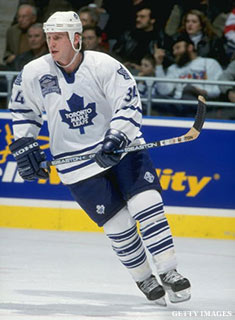
In the mid-90s, Salgado felt he was ready to make himself his boss. He founded Coastal Advisors, LLC, a firm for "Professional Insurance Solutions." The world of sports insurance isn't as popular as the agent business, but he was confident that the connections he had made in Pittsburgh would pay off.
"Insurance has always been there, but it took me a little while to build meaning," he says of Coastal Advisors' early years. "I had to spread the world and let people know what I did and why it's important. I did a lot of networking. I did a lot of selling regards to the concepts of the insurance. Insurance has such a bad rap. You really have to sit down and explain to people it's a very important component. "
How important? Bryan Berard showed that.
Berard, the first overall pick in the 1995 NHL draft, was playing for the Toronto Maple Leafs in 2000 when a stick clipped him in the right eye. Berard suffered a detached retina, and his hockey future was put in jeopardy. Thanks to Coastal Advisors, he reached a $6.5 million insurance settlement.
That settlement allowed Berard to focus on making a comeback rather than finding another career path. Berard missed just one full season, and when he returned to the NHL, he returned the money. But Berard's story sent a clear message: Big Daddy has your back.
"What you see is what you get," Salgado says. "I tell clients the way it is. I don't screw people over."
In the 2000s, as his legitimacy was proven, so did Salgado's popularity. At this same time, athletes, especially NFL players, started to push for more guaranteed money.
"It allows the player to go to sleep at night knowing if, God forbid, something happens, the player will be OK," he says. "In football, you don't have guaranteed contracts, so if something happens, it's over. You don't get paid. You only have the guaranteed portion.
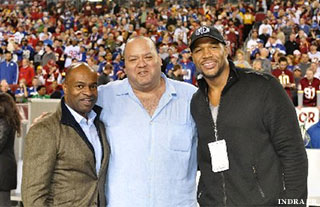
"When team insurance kicks in, it's usually to protect them, not the player. Let's say a guy has a contract at $100 million and $21 million is guaranteed. There's where the insurance peaks come in. That protects that."
In the past month, Salgado went from the NFC championship game in Atlanta to the Pro Bowl in Hawaii to the Super Bowl in New Orleans. His presence is one of his strongest traits.
Identical twins Peter and Chris Ferraro played their first two seasons of their six-year NHL career for the Rangers and connected with Salgado. A decade and a half later, they recently broke ground on a twin rinks facility on Long Island. Their accountant? Their old friend Salgado.
"When we started with the Rangers, he was always at the rink and we remained mildly in touch throughout the course of our careers," Peter says. "When we got back to Long Island after retiring, we reconnected and started communicating. Now he's insuring Ferraro Brothers Ice Center."
Salgado takes pride in his presence. He never wants his clients to feel like he is not accessible.
"I'm working my trade," he says. I'm not settling. I'm always going after new business. I stay out in front. People notice I'm always there. I'm available at all times. It lets people know I don't rest on my laurels."
When young athletes enter the sports realm, Salgado is among the first faces many are introduced. Depending on what representation they settle on, it is not long before rookies sign contracts with Coastal Advisors.
"What happens is the agents, they all know who I am and what I do, so I have some of their clients. They assist in educating their young clients," he says. "Sometimes it works and sometimes it doesn't. A lot of times when it doesn't, it's because people have bad advice."
Salgado also has the ability to reach out to athletes before they are rookies. He can work with NCAA athletes. While student-athletes lose eligibility upon signing with agents, Salgado's work falls under a different category. Anyone can sign for insurance if they can make the down payment.
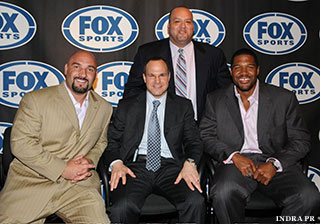
"It's like a kid who needs car insurance," Salgado says. "If you come to me, I can sell it to you. If you need homeowner's insurance, I sell it to you."
If a kid wants career-ending injury insurance, Salgado can sell it to them.
Coastal Advisors has also become increasingly important in an era of lockouts. In the past eight years, the NHL has locked out twice, the NBA once and the NFL once. Each time, athletes looked for Salgodo's outstretched arm.
"They were all out doing things to get in shape while there's no season going on," Salgado says. "They can get hurt and it could be over. With the hockey lockout this year, players were going overseas, so I insured them while they were playing there. That's what happens during these lockouts. Guys start playing in scrimmages and games and not sanctioned sports. There's a possibility they can lose their contract. That's where the insurance component comes in."
Salgado, himself, had an incident that almost caused him to need injury insurance. In 2008, he had trouble hearing and rushed to a doctor. An MRI revealed an aneurism, and Salgado needed surgery. At North Shore-Long Island Jewish Medical Center's Brain Aneurysm Center in Manhasset, N.Y., neurosurgeon David Chalif conducted open brain surgery on Salgado.
"People told me I was going to be laid up for months," he recalls. "I walked out seven days later. Even though I was in bed, I was still working."
In his post-healed life, Salgado does not forget about the work of Chalif and others at the hospital. This past June, he held the first annual Big Daddy Celebrity Golf Classic at Oheka Castle in Huntington, N.Y., to raise money for the aneurism center. A star-studded roster of Salgado's clients and friends attended the event, and he plans to do it again this year.
Even with all the success, Salgado has no plans to slow down any time soon. He does not mind the travel and embraces the hard-working lifestyle. Big Daddy also wants to get in to more work outside of the sports world. He says he is starting to work with CEOs, some of major corporations, and he is widening his clientele in the media.
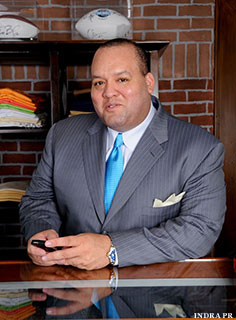
He can use his current clientele to bring in a new wave of prospects.
"Everybody knows who I am and what I do," he says. "I have a good enough reputation."
When a guy is named Big Daddy, he is hard to miss.
"It's kind of funny when you get these college kids. Their parents are like, 'Big Daddy?' That's pretty humorous," he says. "When you get an owner to call you Big Daddy, that's when you start laughing. And there's a few of them that do."
According to Peter Ferraro, Salgado's tireless work ethic comes from both his desire to be successful and his love of his job.
"He does things out of the kindness of his heart and he works hard," Peter says. "The success he has is definitely well earned. He's just a great overall human being and that's very rare in this day and age."
Salgado's brand is on the upswing with plans for Coastal Advisors to open an office in Los Angeles.
Whenever a big event in the sports world in happening or a big-time athlete needs injury insurance, Big Daddy will be there. No one needs to insure that.
-- Follow Jeffrey Eisenband on Twitter @JeffEisenband.




